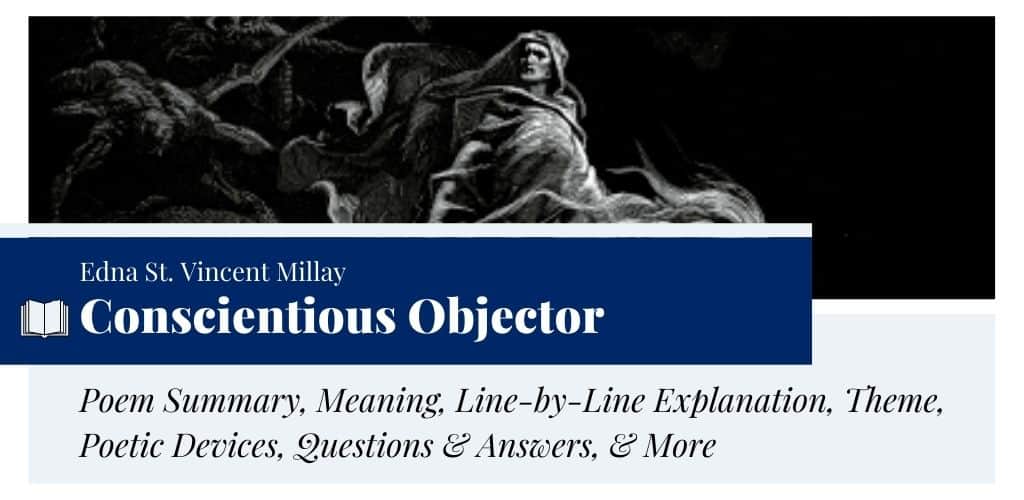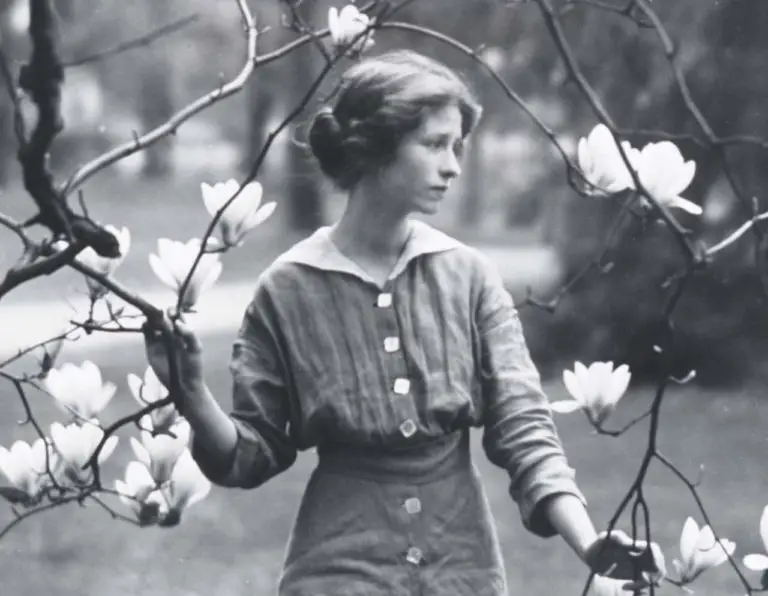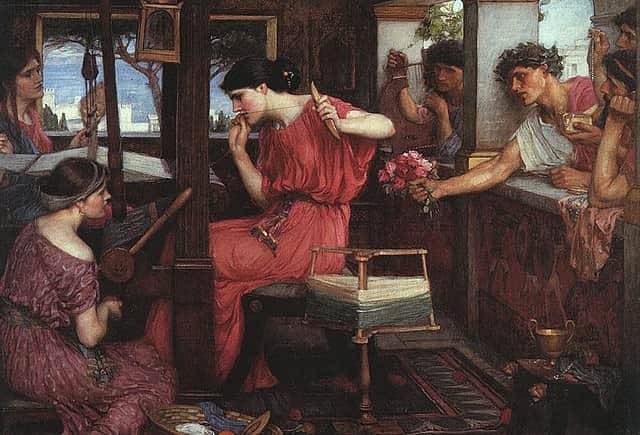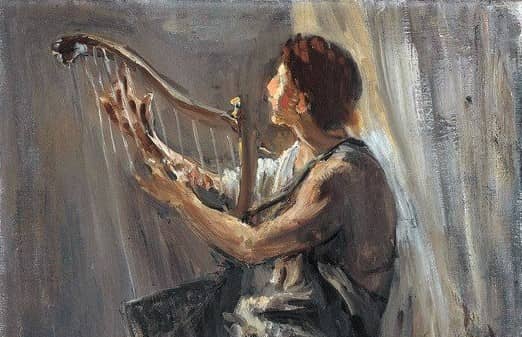Conscientious Objector by Edna St. Vincent Millay
Edna St. Vincent Millay’s free-verse poem “Conscientious Objector” is about a speaker who refuses to disclose the whereabouts of the living of her city to “Death,” starting with a capital “D”. When superpowers clash, one group launches derogatory attacks on the weaker section, or people become war-thirsty, not a lie but the “truth” becomes a greater threat to humankind. The speaker becomes one conchie (shortened form of “conscientious objector”) who abstains from delivering the truth, information to the leader of the land of morally hollow men, Death, an embodiment of all the evils that disrupt universal peace, brotherhood, and harmony.
- Read the full text of “Conscientious Objector” below:
Conscientious Objector by Edna St. Vincent Millay I shall die, but that is all that I shall do for Death. I hear him leading his horse out of the stall; I hear the clatter on the barn-floor. He is in haste; he has business in Cuba, business in the Balkans, many calls to make this morning. But I will not hold the bridle while he clinches the girth. And he may mount by himself: I will not give him a leg up. Though he flick my shoulders with his whip, I will not tell him which way the fox ran. With his hoof on my breast, I will not tell him where the black boy hides in the swamp. I shall die, but that is all that I shall do for Death; I am not on his pay-roll. I will not tell him the whereabout of my friends nor of my enemies either. Though he promise me much, I will not map him the route to any man's door. Am I a spy in the land of the living, that I should deliver men to Death? Brother, the password and the plans of our city are safe with me; never through me Shall you be overcome. - from Collected Poems (1934)

Summary
“Conscientious Objector” begins with Millay’s persona non-compliant to the flowery policies or towering hopes of “Death,” a horseman preparing to latch onto the land of the living. The speaker announces quite boldly, “I shall die, but that is all that I shall do for Death.” She knows her life is so valuable for him to kill. Else, from whom would he get the map, password, or plans of her city?
The speaker is straightforward from the very beginning. Death may be busy making calls to different nations like a President, but Millay’s persona boldly refuses to assist him to ride his horse. He flicks her with his whip for information, yet she remains silent and does not give out the whereabouts of the fox or a black child, her friends, or enemies. Finally, she assures her actual brothers in arms in this non-cooperative, silent battle against Death, that the secrets of their city are safer with her. Death can never get through her with his flicks or promises.
Meaning
The title “Conscientious Objector” gives a hint at the overall meaning of the poem. Firstly, the term signifies one individual who for reasons of conscience, refuses to join the military. The person rejects to perform military services on grounds of freedom of thought, conscience, or religion. Therefore, Millay uses the term in order to hint at her moral grounds for not supporting the war efforts, and also any secessionist forces trying to destroy humanity. This poem can be interpreted as Millay’s non-cooperative declaration against war and enmity against any ethnic and racial communities.
Structure & Form
Millay wrote “Conscientious Objector” in free-verse. It does not have a set rhyme scheme or meter. The text consists of a total of 25 lines separated into three stanzas of 10, 6, and 9 lines each. The last two lines are often grouped together as a single line. Alongside that, the poem is written in the first-person point of view (using the first-person pronoun “I”) and addressed to “Death.” The speaker is none other than the poet herself. She expresses her non-conformist attitude to war, destruction, and hostility. The presence of a first-person speaker alongside the repetition of the line “I shall die, but that is all that I shall do for death” makes this piece a lyric of resistance.
Poetic Devices & Figurative Language
Millay uses a number of poetic devices in the poem “Conscientious Objector.” The main devices are discussed below:
Personification
Millay personifies “Death” (starting with the capital letter “D”) as a horseman. She invests this abstract idea with the attributes of a leader. Death is seen riding a horse and enquiring the speaker about the whereabouts of the living.
Repetition
There is a repetition of the line, “I shall die, but that is all that I shall do for Death” at the beginning of the first stanza and the ending of the second stanza. This line is used as a refrain of the main idea of the poem.
In the second and third stanzas, the phrase “I will not …” is repeated to emphasize the speaker’s moral integrity. She will never disclose the information to Death, no matter how hard he tries.
Enjambment
The poet uses this device to connect the lines internally. Enjambment forces readers to go through consecutive lines in order to understand the speaker’s idea. It occurs in the very first line of the poem:
I shall die, but
that is all that I shall do for Death.
This device is also used in:
- Lines 7-8
- Lines 13-14
- Lines 17-18
- Lines 21-22
- Lines 23-25
Allusion
In the lines, “he has business in Cuba,/ business in the Balkans,” there are allusions to the Spanish-American War in Cuba of 1898 and World War I that was sparked in the Balkans in 1914 by the assassination of Archduke Franz Ferdinand of Austria.
In the lines, “I will not tell him where/ the black boy hides in the swamp,” there can be an allusion to the second Ku Klux Klan (an American hate group) that grew rapidly in 1922-1925.
Alliteration
The repetition of the hard “d” sound at the beginning of neighboring words occurs in the first two lines: “I shall die, but/ that is all that I shall do for Death.” Alliteration also occurs in the following instances:
- “I hear him leading his horse out of the stall”
- “He is in haste; he has business in Cuba”
- “business in the Balkans”
- “may mount”
- “his hoof”
- “black boy”
Anaphora
Anaphora occurs in lines 3-4, beginning with the same phrase “I hear”:
I hear him leading his horse out of the stall;
I hear the clatter on the barn-floor.
It also occurs in lines 15-16. The clauses begin with the phrase “I shall” and the lines start with the pronoun “I”:
I shall die, but that is all that I shall do for Death;
I am not on his pay-roll.
Line-by-Line Explanation & Analysis
Lines 1-4
I shall die, but
that is all that I shall do for Death.
I hear him leading his horse out of the stall;
I hear the clatter on the barn-floor.
In the first four lines of “Conscientious Objector,” Millay’s “conchie” or non-conformist poetic persona makes her point clear. She shall die. That is all she can do for “Death.” The abstract idea, “Death” is personified. It manifests all the evils that exist in society, including war, hostility, racism, etc. This Death is represented as a horseman similar to the apocalyptic horsemen.
The speaker’s stand is firm. She is ready to die but she won’t submit to Death who prepares his horse in order to collect the souls of the dead. Millay uses onomatopoeia in the third line to convey the pounding of horse’s hooves on the ground, creating a mood of preparedness for war. The “clatter” resonates with the sound of military tanks.
Lines 5-10
He is in haste; he has business in Cuba,
business in the Balkans, many calls to make this morning.
But I will not hold the bridle
while he clinches the girth.
And he may mount by himself:
I will not give him a leg up.
According to the speaker, Death is in a hurry. He has several businesses to perform. Two such businesses which the speaker takes special note of, are in Cuba and the Balkans. The reference to Cuba takes readers to the 1890s when the US tried to oust the Spanish government. Several Cubans died in the rebellion and more in the following Spanish-American War.
There is another historical allusion to the Balkan regions where the First World War was sparked by the assassination of Archduke Franz Ferdinand. The US got into the war in 1917 and supported the Allies. Through these references, the significance of “Death” in this poem becomes clear. Millay hints at the American leaders who supported the war efforts by the representation of “Death.” Like an important leader, he makes several calls in the morning and prepares his day plans.
In the last four lines of the first stanza, the speaker refuses to hold the bridle of Death’s horse while he mounts up. It means she will not support, signified by the gesture of giving a leg up, him either in his efforts. Thus, she not only distances herself from performing military services but also refuses to assist Death by providing information.
Lines 11-16
Though he flick my shoulders with his whip,
I will not tell him which way the fox ran.
With his hoof on my breast, I will not tell him where
the black boy hides in the swamp.
I shall die, but that is all that I shall do for Death;
I am not on his pay-roll.
In the second stanza of “Conscientious Objector,” the speaker describes how she will not help Death or what kind of facts she will not disclose. Death with his whip, an instrument of torture, flicks the speaker’s shoulders. Still, she remains silent. From this image of Death carrying a whip, it becomes clear that Millay is depicting him as a slaver.
The speaker refuses to give out the whereabouts of the fox, symbolizing treacherous enemies. They can be a threat to the integrity of the nation. But, she will not break the promise she made to herself. Death may mount his horse on her breast, still, she will not tell him where the “black boy” hides. The boy hiding in the swamps is symbolic of African-Americans who were enslaved in the past.
In the last two lines, the speaker reiterates her oath. She says that she is no longer on Death’s payroll as she has refused to give military services. Thus, she is no longer legally answerable to him.
Lines 17-25
I will not tell him the whereabout of my friends
nor of my enemies either.
Though he promise me much,
I will not map him the route to any man’s door.
Am I a spy in the land of the living,
that I should deliver men to Death?
Brother, the password and the plans of our city
are safe with me; never through me
Shall you be overcome.
The last stanza begins with a surprising remark. She says she will not disclose the whereabouts of her friends or enemies either. This statement makes it clear that the speaker will not take sides in the ongoing war on humanity. Her enemies and friends both are the same for Death. Therefore, if she wants to protect humanity, she has to stand up for both.
Death, with his flowery promises, tries to lure the speaker into giving out the information he needs. But, she will not provide him the direction to any man’s door. She asks a rhetorical question to herself: “Am I a spy in the land of living, that I should deliver men to Death?” It means she will not act as a spy in the land of the living.
In the last lines, the speaker addresses Death as her brother. As the speaker previously worked with him, she addresses him in this way. Now, she is no longer with him as she is a conscientious objector. Quite boldly, she says, the secret codes and plans of her city are safe with her. He can never get through her.
Theme
Millay’s “Conscientious Objector” explores the themes of unacceptance, non-cooperation, and rejection – the three main ideas related to one’s conscientious objection to join or support war efforts. This poem also includes the theme of war, racism, brotherhood, and protection of truth. Millay’s speaker straightforwardly abstains from helping Death, an embodiment of war as well as hostility. By not providing information to the character, the speaker fights another war tougher than the physical one. Her mind fights against the fear of death, torture, and greed. In this way, she keeps fighting this silent, inward battle of non-cooperation and individual resistance.
Historical Context
The poem “Conscientious Objector” was first published in Edna St. Vincent Millay’s Collected Poems in 1934. It was written in the same year. This poem shows Millay’s pacifist stance to the wars her nation directly or indirectly fought against different nations. This poem acts as a testament to her resistance to the government. During the First World War, she remained a pacifist and wrote on the horrors of war. It is quite ironic to note, the same person went to produce propaganda verses during the Second World War. Millay advocated for the US to enter the war against the Axis powers after Pearl Harbor in 1941. She openly supported the war effort while working in the propagandist Writers’ War Board.
Questions and Answers
One of the best-known poems of Edna St. Vincent Millay, “Conscientious Objector” is about a non-conformist, non-cooperative speaker who rejects to give in to “Death,” a symbol of war, racism, and hostility. She shall die and that is all she could do for him. In order to protect the living and weaker sections, she will provide no information to him even if she is tortured and given promises of a better future. All the maps, secret passwords, and plans are safe with her. Death cannot get through her integrity.
In “Conscientious Objector” by Edna St. Vincent Millay, “Death” is personified as a horseman preparing to wage war on humanity. While he mounts up his horse, Millay’s non-cooperative speaker provides no assistance. Nor does she help him hunt down the living by providing the secrets of her city. The character of Death has a whip in his hand flaunting which he tries to intimidate and frighten the speaker. Readers can find a different representation of “Death” in Millay’s “Spring.”
In “Conscientious Objector,” “Death” is depicted as one of the apocalyptic horsemen. As the poem is written in the modern context, the horseman represents the leaders advocating for war, the slavers hunting down African-Americans to enslave, and the soldiers killing innocent humans.
When the poet says that death has business in Cuba and the Balkans, she alludes to the historic events where the US took part either directly or indirectly. She hints at the US involvement in Cuba to wage war against the Spanish rule. The reference to the Balkans implies the location where World War I started. In the later phase of the war, the US had an important “business” of supporting the war effort.
The speaker of “Conscientious Objector” is the poet Edna St. Vincent Millay herself. She writes from the perspective of a persona who is a non-conformist, non-compliant, and non-aggressive.
A conscientious objector is one who for reasons of conscience refuses to carry on military services. The person can abstain from active military service on the grounds of freedom of thought, conscience, and religious beliefs.
The tone “Conscientious Objector” is bold, non-conformist, and fearless. Millay’s speaker describes how she refuses to support Death in his pursuits and hunts. She boldly says, she shall die but she will never assist Death in his inhumane ventures. The tone of this poem is similar to that of the speaker in “Spring,” another best-known poem of Millay.
The speaker’s reference to the black boy hiding in the swamp implicitly criticized the social ill of slavery. Death is projected as a slaver with whips in his hands, out on a hunt of black people.
In the first stanza of “Conscientious Objector,” the speaker describes the things she will not do for Death. Firstly, she will not hold the bridle of Death’s horse while he clinches the girth. Secondly, she will not give him a leg up or support while he mounts up on the horse. He has to do it himself.
The line “I shall die, but that is all that I shall do for death” is repeated twice, at the beginning of the first stanza and the ending of the second stanza. It contains the main idea of the poem that is a speaker’s rejection in supporting Death’s inhumane causes and her acceptance of death in order to protect her integrity.
Edna St. Vincent Millay wrote the poem “Conscientious Objector” in 1934 and it was published in Collected Poems in the same year.
Similar Poems about War & Racism
- “They are hostile nations” by Margaret Atwood — In this poem, Atwood describes the worldwide suffering of humankind and the need for universal peace and cooperation.
- “Every Morning” by Mary Oliver — It’s about a speaker reading the news about the calamities of war, how it affects families, children and causes death on a large scale.
- “Visitors to the Black Belt” by Langston Hughes — This poem does a reality check on African-American lives and how white superiors view their culture.
- “Dreamers” by Siegfried Sassoon — This anti-war sonnet describes the suffering of soldiers on the battleground.
External Resources
- Check out Poems to See By: A Comic Artist Interprets Great Poetry (2020) — This stunning anthology by comic Artist Julian Peters includes fascinating visual representations of classic poems by Emily Dickinson, Maya Angelou, Edna St. Vincent Millay, Robert Frost, etc. The illustration of Millay’s “Conscientious Objector” is really a gem!
- The Poem Aloud — Listen to this amazing reading of Millay’s poem with illustrations of Julian Peters.
- Maya Angelou Reads “Conscientious Objector” — Listen to Angelou’s advice on reading the works of poets, such as Dickinson and Millay, and her reading of Millay’s poem.
- Who is a Conscientious Objector? — Read the definition of the term and about conscientious objections around the world.
- Late 19th-century History of Cuba — Learn about the political events of Cuba in the late 19th-century and the Spanish-American War.
- 20th-century History of the Balkans — Read how the seed of the First World War were sown in the Balkans in the early 20th-century.
- Burning Candles: The Life of Edna St. Vincent Millay — Watch this documentary on Millay’s life and her influential works.
- About Edna St. Vincent Millay — Read more about the poet’s life and works.






